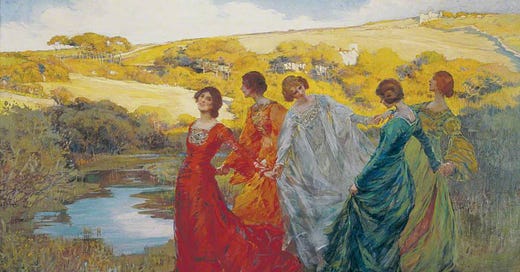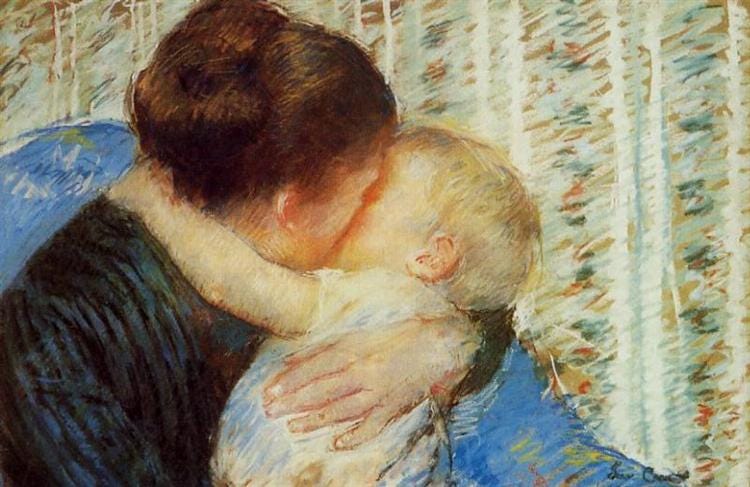Guard Your Daughters by Diana Tutton
A sister novel to add to the ranks of Pride and Prejudice and Little Women
When I come across a particular kind of reader—the kind who grew up with a passel of sisters and whose comfort reading is I Capture the Castle, who loves the coziness of Greta Gerwig’s Little Women and the awkwardness of Frances Ha—I want to push Diana Tutton’s 1950 novel Guard Your Daughters into their hands.
Because if you grew up in close quarters with the idiosyncrasies of sisters speaking that intimate language of shared experience that is foreign to outsiders, then Diana Tutton’s glimpse into the lives of the Harvey sisters feels very real.
Pandora, Thisbe, our narrator Morgan, Cressida, and Teresa have had an unconventional, often scattered, and mainly artistic education at home. The sisters know they are different and have a defensive pride about it. The novel opens with Morgan living in London reflecting back on their home life:
I’m very fond of my new friends, but I do get angry when they tell me how dull my life must have been before I came to London. We were queer I suppose, and restricted, and we used to fret and grumble, but the one thing our sort of family doesn’t suffer from is boredom.
Or as she tells another character in the novel: “Don’t look at me as if I was a brontosaurus…we’re only about fifty years out of date.”
Their sheltered upbringing, however, hints at a darker truth about their lives. Early on a young man named Gregory inquires at the Harvey’s for the use of their telephone. His car has stalled down their hill and he needs an auto-mechanic. The sisters swarm him trying to appear normal and attractive, instead, as they fear, peculiar and over-bearing. But they don’t know how to behave around a single young man, because standing between the girls and the knowledge of the world beyond their home is their mother.
From what we can tell—and Tutton slips in the details only subtly in the midst of witty dialogue and descriptions of tea and piano playing—Grace Harvey is a woman who suffers from highly strung nerves. If you are reminded of another literary mother of five daughters who suffers from her poor nerves, that is, I think, intentional, because in Guard Your Daughters, Diana Tutton works a kind of inverted Pride and Prejudice.
While Mr. Bennet takes delight in vexing his wife without a thought for her nerves, Mr. Harvey and his daughters pay entirely too much attention to Mrs. Harvey’s nerves. They go to great lengths to protect her from anything upsetting. If the main cause of Mrs. Bennet’s anxiety is that her daughters will not find husbands to raise or maintain their station in life, Mrs. Harvey fears that her daughters will find husbands who will take them away or that they will seek lives of their own in other ways. But in both novels, there is friction arising from a mother trying to impose her own vision onto her daughters’ lives.
There are other parallels and allusions to Austen’s novel strewn throughout Tutton’s. There is the arrival of the eligible, single young man in the neighborhood at the start of the novel of course. A very Caroline Bingley-esque character makes an appearance. And there is a panicked moment of family drama that mirrors a similar scene in Pride and Prejudice.
As amusing as I found it to read one witty novel against another, I was moved by that question at play in both stories: how a parent’s hopes and fears affects the way they raise their children.
It’s difficult to see your parents as they are, to see the pressures weighing on them, particularly when you are still young and living under their roof. It’s difficult to see how much of the way they raise you is driven by silent hopes or fears—how much their guarding or their leniency is good and needed and how much it may stifle your development. Then, if you become a parent, it is still difficult to acknowledge how much of your actions are driven by your own latent impulses and more difficult still to realize that even if you do everything faultlessly, in the end, you must relinquish the illusion of control, or else let it fray your nerves to tatters.
Diana Tutton is more suggestive than assertive with her themes and, for the most part, these ideas dance just below the surface of a charming and very funny story. When I closed the book, I was left with a stronger impression of its quirkiness, its coziness, and how the sister relationships felt true to my experience, than I was with its portrayal of dysfunction. And yet that strain of discord has a haunting staying power and I kept coming back to it in the days after I had finished the novel thinking of all the ways we love and are loved imperfectly.
“Dear Mother, with her painting, her wit, her instant sympathy with our small experiments in art, her enormous if mistaken love for us.”
In the future, I’ll consider turning on paid subscriptions. For now, if you’ve enjoyed this piece or any of my other writing and would like to make a one time donation, you can do so here:
And as always, sharing, leaving a comment, or subscribing is much appreciated.






Looking forward to reading this!
Color me intrigued. I must get to know this family! I don't have sisters, so I rely on novels like these to help me understand those relationships. The characters' names alone make me want to pick up this book!